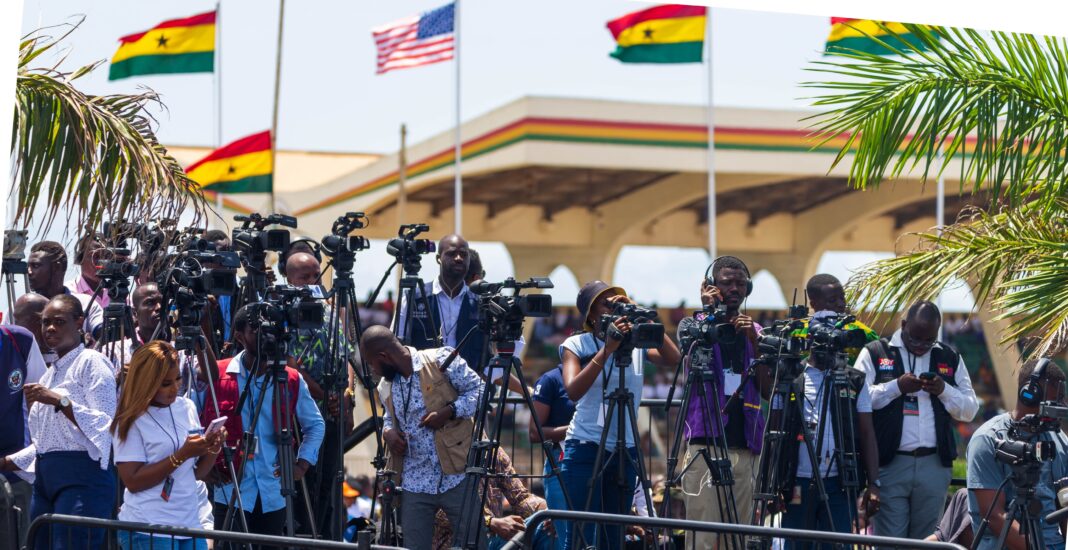For the second successive year, Ghana dropped downward in the annual global press freedom rankings by Reporters Without Borders (RSF). The country fell two places, from 60th in 2022, to 62nd, in the 2023 rankings.
The fine prints show that the country’s overall raw score declined by almost 2 points in the last year, retrograding from 67.43 in 2022 to 65.93 in 2023.
However, in Africa, Ghana’s ranking improved by a point, placing 9th in 2023 as against 10th in 2022.
Even so, a closer look at the details here show that the one-notch climb by Ghana is due more to a steep decline in press freedom on the continent than to any real improvement in the press freedom environment in the country.
The top ten performers in Africa are – Namibia (22) South Africa (25), Cabo Verde (33), Seychelles (34), the Gambia (46), Ivory Coast (54), Burkina Faso (58), Niger (61) Ghana 62 and Mauritius (65).
What the rankings mean for Ghana
Ghana is 62nd best place in the world to practise journalism in the 118th worst place to do so. In Africa, Ghana is the 9th best place on the continent to freely practice as a journalist.
Nearly 40% of all African countries are classified as having a ‘bad’ press freedom environment. Ghana is not only part of the “bad” boys, but is actually worse than junta-ruled Burkina Faso and troubled Niger.
The rankings are established on cumulative scores from five main indicators.
Ghana scored its highest mark on the legislative indicator (79.62), meaning the country has a robust and progressive legal framework regulating the media.
The lowest score was on the security indicators – 61.25. This means that Ghana would have placed 103rd if the assessment was based solely on the safety and security of journalists.
This confirms the recent 2023 report by the University of Ghana and the Media Foundation for West Africa which said nearly a quarter of journalists in Ghana say they do not feel safe
This also underlines the disconnect between Ghana’s enabling media laws and their practical application to uphold and promote press freedom and good journalism.
Evidence of deteriorating safety conditions
- Arrests/Detentions of Journalists
- Kwabena Bobie Ansah (Accra FM), Noah Dameh, Radio Ada.
- The High Court (Criminal Court 5 Division) granted National Security operatives leave to detain freelance journalist, Sacut Amenga-Etego. for unauthorised filming.
2. Physical Attacks
- In May 2022, thugs stormed the studio of Benya FM
3. Traditional Chiefs censor media
- The Ada Traditional Area banned Radio Ada from covering the traditional festival, Asafotufiam.
- Kumasi Traditional Council orders closure of Oyerepa FM.
Factors responsible for the continued slide
- Authorities living in denial;
President Akufo-Addo’s boasts about press freedom during his State of the Nation Address on March 8, 2023;
“Today, we live in a country in which we enjoy complete freedom of expression, freedom of association, freedom of assembly, freedom of religion and political affiliation. Indeed, freedom of speech has now reached such heights that even members of the diplomatic corps feel able to join in our national discourse…”
2. Security agents’ culpability: As frontline institutions for the protection of journalists, security agents are themselves prime perpetrators.
3. Backdoor compromises: there have been many instances where;
i. Abused journalists have been compromised through backdoor settlement.
ii. Managers and/or owners are prevailed upon, based on friendship or other shared interests, to drop cases of abuse against journalists
4. Unethical journalism: journalists/media outlets provoke attacks when;
i. they engage in personal attacks, promote prejudice and stereotyping
ii. repeatedly make false and malicious publications about particular persons, groups and institutions
iii. fail to respect public sensibilities and good taste
5. Inertia on the part of the media: failure to
i. raise the profile of safety of journalists issues and setting the agenda for authorities to consider them as priority national issues.
ii. report the incidents to the police and to follow up to ensure justice is served.
iii. provide adequate safety equipment and training and to establish safety protocols
iv. boycott individuals and institutions that attack journalists and the media





